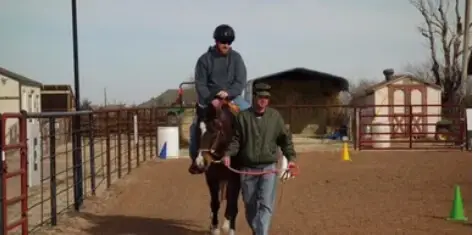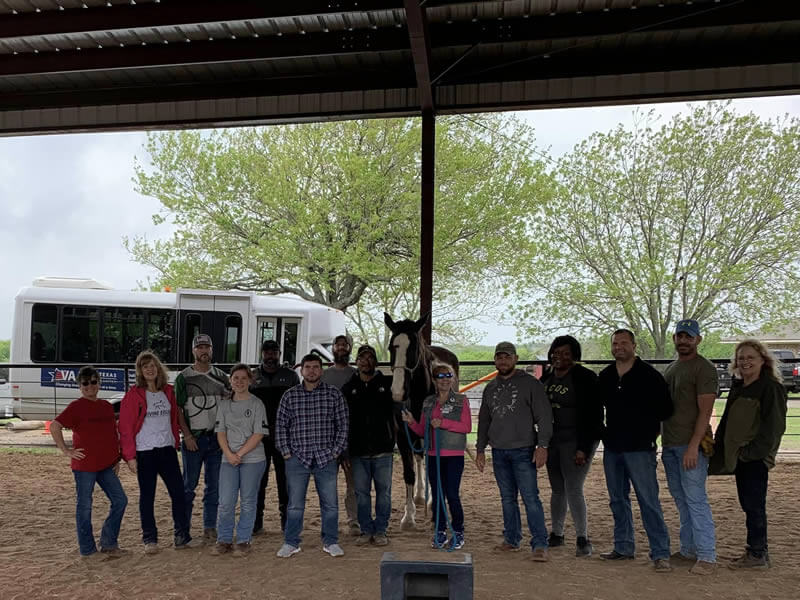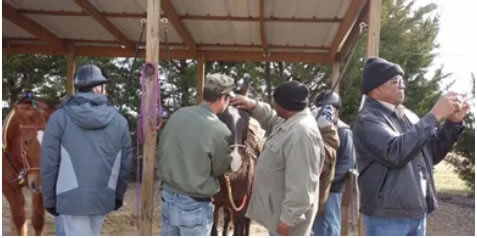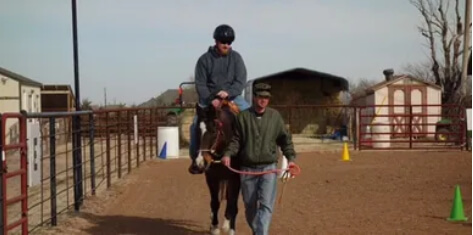
EFP stands for Equine Facilitated Psychotherapy, which is a non-traditional therapy utilizing horses.
Mullen and Mullen has been organizing, participating in, and contributing to community causes that make a real difference, especially for people really need it in Dallas.
This is part of our commitment to the community. Many big out of town or out of state law firms come to Dallas, setup satellite locations, buy billboards and TV ads and make themselves seen everywhere.
But they’re not a part of the community and they don’t give back. By contrast, we only exist because of our local community. This is our back yard and it has been for 40 years.
Mullen & Mullen Law Firm joined forces with Divine Equine Therapeutic Riding Center, to sponsor and bring awareness to their EFP program in North Texas that assists Veterans and first responders.
EFP stands for Equine Facilitated Psychotherapy, which is a non-traditional therapy utilizing horses. In studies, EFP has shown to help reduce symptoms of PTSD and other trauma-related conditions. Instead of asking participants to talk about and relive their trauma, which most are reluctant to do, it fosters confidence, trust building, emotional grounding, and self-reflection by teaching horse skills.

Veterans and first responders suffer from many of the same stress and trauma-related mental health conditions, like post-traumatic stress disorder (PTSD), depression, anxiety, anger, traumatic brain injury (TBI), substance abuse, inability to trust, trouble reintegrating, and increased suicide rates.
As the very true saying goes, you cannot hide anything from a horse. Whatever feelings you bring into their space, they will mirror back to you, creating the perfect, non-verbal, biofeedback loop. And horses have a heightened sensitivity and flight or fight response, which makes them ideal for an EFP program.
While interacting with a horse, you are not thinking about your past trauma or worrying about the future but are required to remain calm. Working with a horse requires you to be 100% present with your own feelings which teaches self-regulation in a way traditional talk-therapy can’t.
Also, a horse’s heart has an electromagnetic field five times greater than that of a human. To understand how this is relevant to helping with trauma responses, read: Cardiac Coherence: The Inner Power that Horses Reveal to Us. This is wonderful information for anyone considering EFP.

Veterans Learning Horse Skills at Divine Equine Therapeutic Riding Center in Sherman, TX
Specifics About this EFP Program in North Texas for Veterans & First Responders
This program at Divine Equine Therapeutic Riding Center, is an experiential therapeutic program designed to create a powerful experience for each group participant. Rather than talking one-on-one with a therapist in an office, the course offers an outdoor setting combining a trauma-focused psychotherapist, and a PATH International Certified instructor.

Veteran Learning to Ride at Divine Equine Therapeutic Riding Center in Sherman, TX
This program is customized based on participant needs with modifications for disabilities and all needed equipment is provided. EFP is designed to help reduce trauma responses while learning self-regulation, mindfulness, boundaries, confidence, and trust. The participants learn to recognize their triggers, emotional responses, and how to release toxic trauma they may be holding onto.
Divine Equine Therapeutic Riding Center
2822 Luella Rd, Sherman, TX 75090
If you are interested in being sponsored, please officially register as a new rider here:
https://form.jotform.com/61735311277151?fbclid=IwAR1yQ2p7ouzXdWMU2cj8Vbh5b0ijq3uzR1NzxkCO2wXnD7QN3uFfKhuP-jg
At the bottom of the form, where it asks the days and times you are available, select all that apply. And where it asks, “What Program are you Interested in” select BOTH the Equine Facilitated Psychotherapy and Veteran Programs.
If you are interested in helping support this program and the efforts of these two organizations, you can learn more about them and donate by visiting their website.
Equine-Facilitated Psychotherapy (EFP) is an innovative and effective form of therapy that combines the healing power of horses with traditional psychological techniques. This therapeutic approach has gained significant recognition and popularity in recent years, providing individuals with a unique opportunity to embark on a transformative journey of self-discovery, healing, and personal growth. By harnessing the intuitive and sensitive nature of horses, EFP creates a safe and supportive environment for clients to explore their emotions, build trust, and develop essential life skills. Here we explore the profound impact of equine-facilitated psychotherapy, highlighting its benefits, techniques, and underlying principles.
At the heart of EFP lies the belief that horses possess inherent qualities that enable them to serve as therapeutic partners. Horses are highly attuned to non-verbal cues, making them astute observers of human behavior and emotions. Their ability to sense and mirror the emotional states of individuals forms the basis of EFP. By interacting with horses, clients develop self-awareness, emotional regulation, and relational skills that are crucial for personal growth.
Emotional Regulation: Horses provide a non-judgmental space for individuals to explore and express their emotions. Through their gentle presence, horses encourage clients to identify and regulate their feelings, promoting emotional well-being and resilience.
Trust Building: Horses, as prey animals, rely on their ability to trust and form relationships to survive. Interacting with horses teaches clients the importance of trust and empowers them to build healthy connections with both horses and humans. This newfound trust often extends beyond the therapy session, positively impacting their relationships in everyday life.
Enhancing Communication Skills: Horses respond to non-verbal communication, allowing clients to refine their ability to express themselves effectively. In EFP, individuals learn to be aware of their body language, develop clear boundaries, and adapt their communication styles to establish a harmonious connection with the horses. These skills transcend the equine realm, leading to improved communication in personal and professional relationships.
Self-Reflection and Self-Awareness: Working with horses provides a reflective space for clients to gain insights into their own behavior and emotional patterns. Horses act as unbiased mirrors, offering immediate feedback to individuals’ emotions and behaviors. This process fosters self-awareness, allowing clients to identify and challenge negative patterns, leading to personal growth and transformation.
Ground-Based Activities: These activities involve interacting with horses on the ground, such as grooming, leading, and observing their behavior. Ground-based activities focus on developing trust, setting boundaries, and establishing a mutual connection between the client and the horse.
Equine-Assisted Learning: In this approach, clients engage in structured exercises and problem-solving tasks with horses. These activities encourage individuals to develop critical thinking skills, decision-making abilities, and creative problem-solving techniques.
Therapeutic Riding: Riding sessions involve physical engagement with the horse, promoting balance, coordination, and confidence. This technique enhances body awareness and fosters a sense of empowerment and achievement.
Equine-Facilitated Psychotherapy offers a profound and transformative healing experience, leveraging the remarkable sensitivity and intuition of horses to assist individuals in their journey toward emotional well-being and personal growth. By combining traditional psychological techniques with the unique bond between humans and horses, EFP provides a safe and supportive environment for clients to explore their emotions, develop essential life skills, and foster meaningful connections. As EFP continues to gain recognition, it is becoming increasingly evident that horses have an extraordinary ability to help people heal.
Equine-Facilitated Psychotherapy (EFP) has emerged as a powerful therapeutic approach for addressing the unique mental health challenges faced by veterans. Veterans often experience a range of emotional and psychological issues resulting from their military service, such as post-traumatic stress disorder (PTSD), depression, anxiety, and difficulties with reintegration into civilian life. EFP offers a holistic and impactful intervention that harnesses the healing power of horses to support veterans in their journey toward recovery and improved well-being. This essay explores the profound benefits of equine-facilitated psychotherapy for veterans, highlighting its potential to heal invisible wounds, enhance resilience, and foster a sense of connection and purpose.
The journey of healing and recovery for veterans grappling with the emotional and psychological impact of their military experiences can be arduous. Traditional therapeutic approaches often struggle to address the complex needs of veterans. However, working with horses in various therapeutic settings has emerged as a powerful and innovative approach that offers profound healing opportunities. This essay explores how working with horses can aid in the healing process for veterans, discussing the therapeutic benefits, including emotional regulation, building trust, fostering connection, and promoting overall well-being.
Addressing PTSD and Trauma: Equine-Facilitated Psychotherapy has shown promising results in the treatment of post-traumatic stress disorder (PTSD) among veterans. The calm and non-judgmental presence of horses creates a safe space for veterans to explore their traumatic experiences and accompanying emotions. Horses, highly attuned to non-verbal cues, mirror and respond to the veterans’ emotional states, promoting self-awareness and emotional regulation. The process allows veterans to gradually build trust, reduce anxiety, and develop coping strategies to manage PTSD symptoms.
Emotional Regulation and Self-Awareness: Veterans often struggle with emotional dysregulation as a result of their experiences. Interacting with horses in EFP encourages veterans to identify, express, and regulate their emotions effectively. Horses respond to subtle changes in body language and energy, teaching veterans to become more aware of their own non-verbal cues. Through this process, veterans gain valuable insights into their emotional triggers, empowering them to manage their emotions more effectively both in and outside of therapy.
Building Trust and Establishing Boundaries: Veterans may struggle with trust-related issues due to their military experiences. Horses, as prey animals, possess a natural ability to sense and respond to trust and authenticity. Through working with horses, veterans can rebuild trust by developing connections based on mutual respect and understanding. Horses provide unbiased feedback, reflecting the veterans’ behaviors and emotions, reinforcing the importance of establishing clear boundaries and effective communication. These experiences with horses can then be translated into healthier interpersonal relationships in the veterans’ lives.
Promoting Self-Confidence and Empowerment: EFP provides veterans with experiences that promote a sense of accomplishment and empowerment. Learning to groom, lead, or ride a horse requires patience, focus, and perseverance. As veterans master these skills, they gain confidence in their abilities and develop a sense of achievement. The process of building a relationship with a horse also allows veterans to reconnect with their own strengths and resilience, boosting their self-esteem and self-worth.
Sense of Purpose and Personal Growth: Working with horses offers veterans a renewed sense of purpose and personal growth. The responsibility of caring for another living being and contributing to its well-being can instill a sense of importance and meaning. Through their interactions with horses, veterans develop skills such as patience, resilience, and problem-solving, which are transferable to other areas of their lives. The journey of growth and self-improvement alongside horses can empower veterans to redefine their identities beyond their military service, opening doors to new possibilities and aspirations.
Promoting Physical and Psychological Well-being: The physical aspect of working with horses contributes to the overall well-being of veterans. Engaging in activities such as grooming, riding, or caring for horses provides a range of physical benefits, including increased exercise, improved coordination, and enhanced motor skills. These physical activities release endorphins and promote relaxation, reducing symptoms of anxiety and depression commonly experienced by veterans. Moreover, the calming and grounding presence of horses can have a positive impact on veterans’ mental well-being, providing a respite from intrusive thoughts and fostering a sense of peace and serenity.
Fostering Connection and Social Engagement: Isolation and detachment are common challenges faced by veterans, leading to feelings of loneliness and disconnection. Working with horses facilitates a sense of connection and social engagement, providing veterans with opportunities for meaningful interaction. As they develop relationships with horses, veterans experience the benefits of non-judgmental companionship and the bond that can form between humans and animals. Participating in equine-assisted group activities further promotes social engagement, allowing veterans to connect with peers who share similar experiences, fostering a sense of belonging and support.
Facilitating Reintegration and Meaningful Engagement: Transitioning from military to civilian life can be challenging for veterans. EFP offers a supportive environment for veterans to explore their identity, reestablish purpose, and find meaning beyond their military service. Working with horses provides a sense of structure, responsibility, and connection, which can aid in the transition process. Additionally, participating in EFP programs that involve group activities and peer support fosters a sense of camaraderie and shared experiences, reducing feelings of isolation and promoting social reintegration.
Equine-Facilitated Psychotherapy holds tremendous potential for supporting the mental health and well-being of veterans. By harnessing the innate qualities of horses, such as their sensitivity, non-judgmental nature, and ability to establish profound connections, EFP offers a unique and transformative therapeutic experience. The benefits of EFP for veterans include addressing PTSD and trauma, enhancing emotional regulation and self-awareness, rebuilding trust and establishing boundaries, promoting self-confidence and empowerment, and facilitating reintegration and
Working with horses has demonstrated remarkable potential in promoting healing and well-being for veterans. The unique qualities of horses, including their sensitivity, non-verbal communication, and ability to establish authentic connections, create a therapeutic environment conducive to the recovery process. Through emotional regulation, trust-building, fostering connection, and promoting overall well-being, working with horses empowers veterans to embark on a transformative journey of healing, personal growth, and reintegration into civilian life. As this innovative approach gains recognition
Veterans play a crucial role in safeguarding their nation’s security and upholding the values of freedom and democracy. Yet, behind their honorable service lies a pressing issue that demands attention: the alarming rates of veteran suicides. The tragic reality of veteran suicide is a stark reminder that the battle does not always end on the battlefield. This essay explores the causes behind this distressing phenomenon and emphasizes the urgent need for comprehensive support systems to address and prevent veteran suicides.
Post-Traumatic Stress Disorder (PTSD) and Mental Health Challenges: One significant factor contributing to veteran suicide rates is the high prevalence of mental health challenges, particularly post-traumatic stress disorder (PTSD). Experiencing the traumas of war and witnessing the horrors of combat can have long-lasting psychological effects. The invisible wounds of war, such as PTSD, depression, anxiety, and substance abuse, can overwhelm veterans and exacerbate feelings of despair and hopelessness.
Difficulty in Transitioning to Civilian Life: The transition from military to civilian life can be challenging and overwhelming for many veterans. After years of structured routines, camaraderie, and a clear sense of purpose, the loss of identity and the lack of a support system can lead to feelings of isolation and detachment. Financial difficulties, unemployment, and the strain of readjusting to civilian society further compound the stress experienced during this transition, potentially pushing some veterans to the brink.
Inadequate Access to Mental Healthcare: Insufficient access to mental healthcare services is a critical issue faced by veterans. Long wait times, limited availability of specialized care, and stigma associated with seeking help can deter veterans from seeking the assistance they desperately need. Insufficient resources and funding for mental health programs have resulted in a lack of support structures, leaving veterans vulnerable and exacerbating the risk of suicide.
Co-Occurring Factors and Risk Factors: Several co-occurring factors contribute to the heightened risk of suicide among veterans. Substance abuse, chronic pain resulting from combat injuries, relationship difficulties, and experiences of homelessness can compound the already complex web of challenges faced by veterans. Furthermore, the availability of firearms, coupled with impulsive tendencies that may arise from mental health conditions, increases the likelihood of fatal outcomes.
Societal Attitudes and Awareness: Societal attitudes towards mental health play a significant role in addressing the issue of veteran suicide. Overcoming the stigma associated with seeking help and fostering an environment that encourages open dialogue about mental health challenges is crucial. Raising public awareness about the realities faced by veterans and the importance of support networks is essential in dismantling barriers and creating an empathetic society.
The issue of veteran suicide rates demands urgent attention and a multifaceted approach. Efforts must focus on addressing the underlying causes, such as PTSD, the challenges of transitioning to civilian life, and the lack of accessible mental healthcare. Governments, healthcare providers, and communities must collaborate to ensure comprehensive support systems are in place, including increased funding for mental health programs, improved access to specialized care, and targeted initiatives to combat veteran homelessness and unemployment. Equally important is the cultivation of a compassionate society that acknowledges the sacrifices made by veterans and provides them with the support they deserve. By recognizing the hidden battles faced by veterans and working collectively to address them, we can strive towards a future where veteran suicide rates are significantly reduced, allowing those who have served to find hope, healing, and a renewed sense of purpose.
Copyright © 2024 Mullen & Mullen Law Firm. All Rights Reserved.
LICENSED BY THE STATES OF TEXAS & MISSOURI FOR THE GENERAL PRACTICE OF LAW. The information on this website is not intended to be legal advice. That can only come from a qualified personal injury lawyer who is familiar with all the circumstances and facts of your specific case and the law relevant to it.